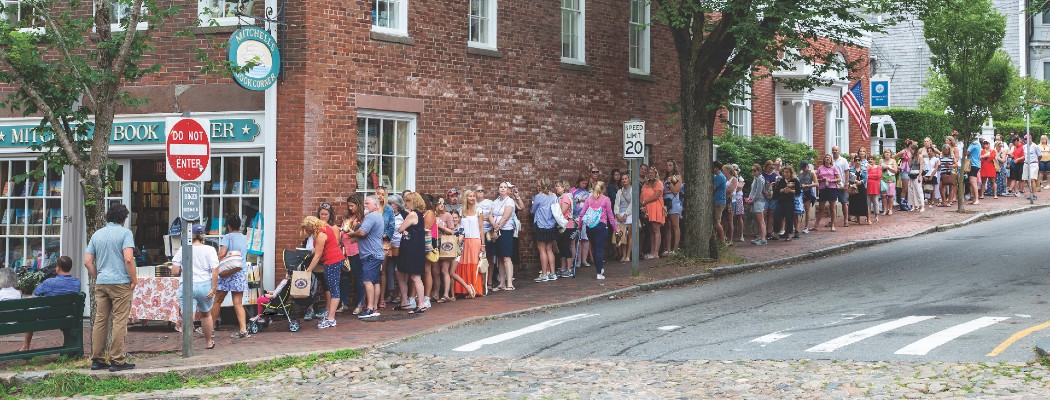Analyzing the reverberations of a very busy summer.
How about that pent-up demand? You didn’t even need to be on Nantucket to get a sense of just how busy it was this summer. From the Steamship dock in Hyannis alone—where at one time more than 120 vehicles were waiting in the standby line—the Sold-Out Season of 2021 was on full display. On-island, traffic was abysmal, trash cans were overflowing, hotels were booked solid, cell reception was spotty, and dinner reservations were harder to come by than parking spots. Boston MedFlight set a new record for emergency flights off the island. The airport ran out of jet fuel—not once, but twice. Some feared that the island would run out of water. And just about everyone probably ran out of patience. It was a summer like no other, but just how much of an outlier was it? Was this really the busiest summer on record? Or was it an optical illusion, the shock of waking up from our COVID-19 hibernation?
 While anecdotes abound, statistics reveal some of the complexity in answering that question. “As busy as 2021 seemed, passenger numbers were still below any pre-pandemic year,” said Steamship Authority board member Rob Ranney. According to Ranney, the busiest year on record for both passengers and cars coming to the island was 2016. While 2021 did not exceed 2016’s passenger numbers, this year set a new record for vehicles coming over to the island. As of September, the number of vehicles had already blown the 2016 count out of the water by 1,200, or about 5 percent.
While anecdotes abound, statistics reveal some of the complexity in answering that question. “As busy as 2021 seemed, passenger numbers were still below any pre-pandemic year,” said Steamship Authority board member Rob Ranney. According to Ranney, the busiest year on record for both passengers and cars coming to the island was 2016. While 2021 did not exceed 2016’s passenger numbers, this year set a new record for vehicles coming over to the island. As of September, the number of vehicles had already blown the 2016 count out of the water by 1,200, or about 5 percent.
“There was about a three-week period leading up to the Fourth of July that routinely saw over one hundred cars and thirty trucks in standby every day in Hyannis waiting to come over to Nantucket,” said Ranney. “This caused some issues with vehicle staging and forced the standby line in Hyannis to be closed for short periods of time so as to be able to deal with the volume of cars and trucks at the terminal.” This dramatic increase in cars and trucks is the obvious explanation for the increase in traffic clogging the island.
A similar story could be found at Nantucket Memorial Airport where, although overall flight and passenger numbers were down compared to pre-COVID years, the number of private jets and major air carriers like Jet Blue, United and Delta were up. “With the increase in air carrier operations, the terminal is too small to handle the demand,” said Patrick Topham, Nantucket Memorial Airport’s control tower chief. “There can be five to six air carriers here at the same time, with one hundred passengers per plane, so it doesn’t take long to run out of space.” This space only got tighter this fall when the airport was forced to close a runway after the FAA deemed it “non-standard,” which Topham explained made it ineligible for the FAA’s Airport Improvement Program funding. “Due to the lack of funding, the airport has decided to close the runway,” he said, “which will lead to delays in and out of Nantucket.”
 Another point of concern is the island’s natural resources. Last summer, Wannacomet Water Company pumped 307 million gallons of water from June through August, setting a new record. “We never thought we would top it,” said Wannacomet’s director, Mark Willett. “Then in 2021, over the same summer time period, we pumped over 337 million gallons of water—more than a 10 percent jump.” Willett explained that the unprecedented pumping can be attributed to the increase in people on the island as well as the decrease in rain (“people use more water when it’s hot and dry.)” Beyond any other summer, Wannacomet logged more days pumping in excess of 4 million gallons of water. The pumps ran twenty-four hours a day, stressing the system and causing a couple main breaks and pump issues. “We delivered more water to our customers than ever before,” said Willett, who estimated that there were between 90,000 and 100,000 people on-island this summer based on his water data.
Another point of concern is the island’s natural resources. Last summer, Wannacomet Water Company pumped 307 million gallons of water from June through August, setting a new record. “We never thought we would top it,” said Wannacomet’s director, Mark Willett. “Then in 2021, over the same summer time period, we pumped over 337 million gallons of water—more than a 10 percent jump.” Willett explained that the unprecedented pumping can be attributed to the increase in people on the island as well as the decrease in rain (“people use more water when it’s hot and dry.)” Beyond any other summer, Wannacomet logged more days pumping in excess of 4 million gallons of water. The pumps ran twenty-four hours a day, stressing the system and causing a couple main breaks and pump issues. “We delivered more water to our customers than ever before,” said Willett, who estimated that there were between 90,000 and 100,000 people on-island this summer based on his water data.
Despite this dramatic spike in water use, Willett says he is not remotely concerned about the island ever running out of water. “Billions of gallons of precipitation recharge our aquifer every year,” he explained. “As it sits now, we pump out under 10 percent of that recharge. If you look at it like a water budget, we are not spending more than we make. We currently have a surplus of water.”
The concern is instead not quantity but quality. If the island’s aquifer became contaminated, there’s no nearby town to borrow from. Accordingly, Willett says that Wannacomet continues to push for new ways to protect the water source like fertilizer regulations, Zone II regulations and stormwater regulations. Because, as he says, “where would Nantucket be with- out clean drinking water?”
 Perhaps the most precious natural resource this summer was not water but people. Staffing shortages hamstrung operations across the island, making the onslaught of summer visitors that much more challenging. “We definitely had a coming-out-of-COVID surge that made it seem as though it was busier than it ever had been before,” said Town manager Libby Gibson. “With respect to Town operations, we struggled this year. Without more staff and ways to house them, things are going to continue not to get done.” Much like with restaurants where staffing challenges became so dire that some high-end establishments resorted to employing local eighth graders, Gibson said that the lack of Town staffing caused “a lot of things to slip” this summer. “It was very hard to keep up with things like trash,” she said. “Part of that is we don’t have enough staff to pick up trash, and part of that is personal responsibility that people are not acting as they should.”
Perhaps the most precious natural resource this summer was not water but people. Staffing shortages hamstrung operations across the island, making the onslaught of summer visitors that much more challenging. “We definitely had a coming-out-of-COVID surge that made it seem as though it was busier than it ever had been before,” said Town manager Libby Gibson. “With respect to Town operations, we struggled this year. Without more staff and ways to house them, things are going to continue not to get done.” Much like with restaurants where staffing challenges became so dire that some high-end establishments resorted to employing local eighth graders, Gibson said that the lack of Town staffing caused “a lot of things to slip” this summer. “It was very hard to keep up with things like trash,” she said. “Part of that is we don’t have enough staff to pick up trash, and part of that is personal responsibility that people are not acting as they should.”
The latter point suggests that the pressures felt this summer might have less to do with the quantity of people on the island as the quality. Whether it was in parking lots, restaurants or intersections, many complained of a general breach in civility. However, did this bad behavior translate to an uptick in arrests? “No, quite the opposite,” said Police Chief Bill Pittman. “While the number of actual in-custody ‘arrests’ was up in 2021 versus 2020, the number of summonses issued in lieu of an in-custody ‘arrest’ was down significantly. Basically, whether it was an arrest or a summons, our arrest/summons/protective custody activity was down 29 percent versus 2020 and down 39 percent versus 2019, which was the last ‘normal year.’”
Perhaps criminal activity was down, but what about overall bad behavior? This fall, the State Police indicated that they had confiscated more than five hundred fake IDs from bars and restaurants. The proliferation of fake IDs and the overall lack of civility caused the Gazebo to enforce a twenty-five-and-over mandate. So did more people equate to more loud debauchery?
 “Well, again, not really,” said Pittman. “I compared disturbance calls (not noise) and loud party calls and found again that our numbers were down over the prior two years. We were down 5 percent versus 2020 and 22 percent versus 2019. That would indicate that bad behavior is either being tolerated more or occurred less.”
“Well, again, not really,” said Pittman. “I compared disturbance calls (not noise) and loud party calls and found again that our numbers were down over the prior two years. We were down 5 percent versus 2020 and 22 percent versus 2019. That would indicate that bad behavior is either being tolerated more or occurred less.”
The same dip in calls, however, could not be said of the Fire Department, which experienced a 20 percent increase in fire response calls compared to last year and a 9 percent increase compared to 2019. “Calls as a whole have increased,” said Fire Chief Stephen A. Murphy, who also indicated that while the number of actual fires remained mostly the same (around forty), calls for other needs such as investigating the smell of gas have increased by 60 percent since 2019. “One of the largest issues for meeting the needs [of the community] has been staffing for multiple calls. Our department is staffed to handle multiple calls when the shifts are at full complement. But with time off, shifts do run at minimum staffing in all seasons; staffing the second call can be challenging.”

In another town, when a house goes up in flames, there will likely be up to thirty firefighters from a number of different ladder companies attending to the blaze. On Nantucket, a structure fire might have twelve. “Housing is an issue that people can help with and think of public safety when they have a year-round rental,” said Murphy. “If your firefighters are not able to live here, who will come back when we need them? The path that rentals have taken is endangering the stability of staffing for the department and many town or island businesses.”
 Ultimately, lodging was a key indicator of just how busy it was this summer. Hotels and inns had an outstanding season, booking unprecedented numbers of guests from early spring to late fall that at times resulted in there being absolutely no vacancies on the island. “It was certainly a record year,” said Garison Beale, general manager of the Greydon House on Broad Street. “We’re looking at almost 25 percent more occupancy than 2019 for Greydon House in the summer. Guests were thrilled to be back, and a decent amount of guests were avoiding Europe and staying more local.” Though happy with the business, the lodging industry also faced the same pressures felt across the island, trying to stay a step ahead of the never-ending wave of demand. “We’re like everyone: balancing appreciating the business and the ebbs and flows of the island,” said Mark Snider, the owner of the Nantucket Hotel. “The island has to come to terms with that. It’s a desirable place, people want to be here, and it’s special. But the infrastructure has to support the demand. It’s a balancing act.”
Ultimately, lodging was a key indicator of just how busy it was this summer. Hotels and inns had an outstanding season, booking unprecedented numbers of guests from early spring to late fall that at times resulted in there being absolutely no vacancies on the island. “It was certainly a record year,” said Garison Beale, general manager of the Greydon House on Broad Street. “We’re looking at almost 25 percent more occupancy than 2019 for Greydon House in the summer. Guests were thrilled to be back, and a decent amount of guests were avoiding Europe and staying more local.” Though happy with the business, the lodging industry also faced the same pressures felt across the island, trying to stay a step ahead of the never-ending wave of demand. “We’re like everyone: balancing appreciating the business and the ebbs and flows of the island,” said Mark Snider, the owner of the Nantucket Hotel. “The island has to come to terms with that. It’s a desirable place, people want to be here, and it’s special. But the infrastructure has to support the demand. It’s a balancing act.”
Looking toward next summer, there’s nothing to suggest that this balancing act is going to end anytime soon. As the housing crisis continues to confound planners, spotty staffing will remain a pitfall in delivering the Nantucket experience that has brought so many to our shores. However, while good solutions are hard to come by, Nantucket has ingenuity in its DNA. The island’s history is dotted with chapters when it has completely reinvented itself to meet the times. What that looks like in the post-COVID Nantucket is yet to be seen.









